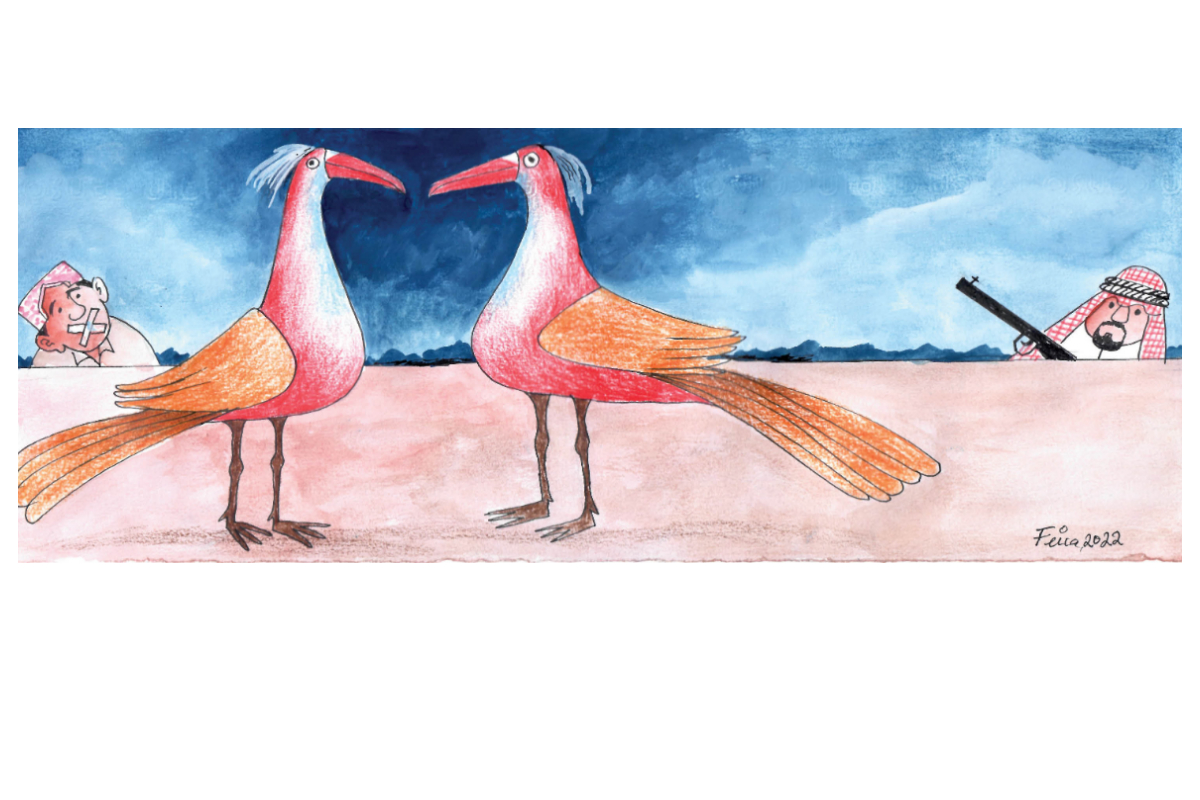
The hunt continues
Govt issues winter permit to royals, Foreign Ministry directs Sindh govt to facilitate guests
THATTA: A year after the brutal murder of Nazim Jokhiyo,
the Arab royals are ready to descend upon rural Sindh in their SUVs after being given a three-month permit to hound a ‘rare bird’ that is officially banned for hunting.
The Ministry of Foreign Affairs, headed by Bilawal Bhutto Zardari, has directed the Sindh government to extend ‘maximum facilities’ to the wealthy Arab princes who love to eat ‘Tilors’ or Hobura Bustard, a Central Asian bird that flies to its second home in Pakistan every winter. Officials of the Revenue and Forest Departments scrambled to follow the minister’s order, who also happens to be the Chairman of the party that has been ruling Sindh for 15 years.
The authorities were quick to issue a three-month hunting permit to the Arab Sheikhs that remains valid till January next year, shrugging off the uproar caused by the killing of a young Malir farmer exactly a year ago. Nazim Jokhio, 26, was tortured and killed allegedly by the ruling PPP Member of Parliament Jam Awais’ in his farmhouse. He was guilty of filming Arab hunters and raising his voice against the killing of the bird by posting videos on social media.
“As soon as the officials receive the itinerary of Arab royals coming in for hunting, they start evacuating the locals from the areas marked for the hunting of Houbara Bustards. They make sure that no one comes their way this time,” said Iqbal Jakhro, a local journalist while commenting on the hunting trend of the migratory birds in Sindh.
“The content of the permit requires 50 per cent of the fees to be spent on the areas where hunting takes place, but in reality, it rarely happens,” he added. According to Jakhro, the locals in Mithi, Umerkot, Thatta and Khairpur resisted the hunting practice by Arabs, particularly after the Nazim Jokhiyo murder. This is why the administration at the district level has been directed to keep the security alert in areas where Arab guests would play their hunting game.
The shy, rare bird about the size of a chicken is considered to be an aphrodisiac among the Arabs. Around 40,000 Houbara Bustard migrate to Pakistan every year for about six months. Earlier, they used to travel further south towards the Arabian Peninsula, but now they face extinction due to the excessive hunting in Pakistan. The hunting parties are given a limit of 100 birds in a maximum 10-day period but often exceed their quota. The international law regarding the preservation of endangered species stresses conservation actions for migratory species.
The WWF has repeatedly shown concerns about the protection of endangered species but Pakistan lacks any initiative that could prevent such ruthless hunting.
The month of November marks the arrival of migratory birds in Sindh from the Siberian shores, and the hunters from the Arab world – mostly from royal families, set up tent cities in the plains. According to residents, the place where Arab royals stay becomes a “no-go area” for the locals.
Muhammad Bachal Jakhro, a local of the area, apprised that feudal lords are tasked to finalise arrangements ahead of guests’ arrival as they give a handsome amount in return. The Chairman Senate Sadiq Sanjrani visited Tharparkar himself to assess the arrangements made for the stay of Arab guests.
Recalling the throbbing memories, Pir Bux Soomro an elderly man from Junghshahi in Thatta, says he cannot forget the incident when the bodies of two teenage sisters were found at the camp of Arab royals who came for hunting near Thatta in 1986. An initial medical report showed the brutal rape of young sisters which became the cause of their death. A similar incident came to light on the intervening night of 14 and 15 December 1997 at the Rahemki Bazar area near Badin and Tharparkar district where two young women met the same fate of sexual assault and torture allegedly by the visiting Arab guests. The victims’ relatives did receive some money in compensation, but not justice.
For decades, Sindh and Balochistan have seen unchecked hunting practices despite the inclusion of migratory birds in the list of endangered species by the global authorities. The government has been allowing Arab royals to hunt the bird in Pakistan since the 1960s when Sheikh Zayed bin Sultan Al-Nahyan, the founder of the UAE, started coming with his falcons to hunt. In 2016, BBC News termed Pakistan the ‘Houbara Hunting Industry’.
Catch all the Urban Insight News, Breaking News Event and Latest News Updates on The BOL News
Download The BOL News App to get the Daily News Update & Live News.












 Read the complete story text.
Read the complete story text. Listen to audio of the story.
Listen to audio of the story.